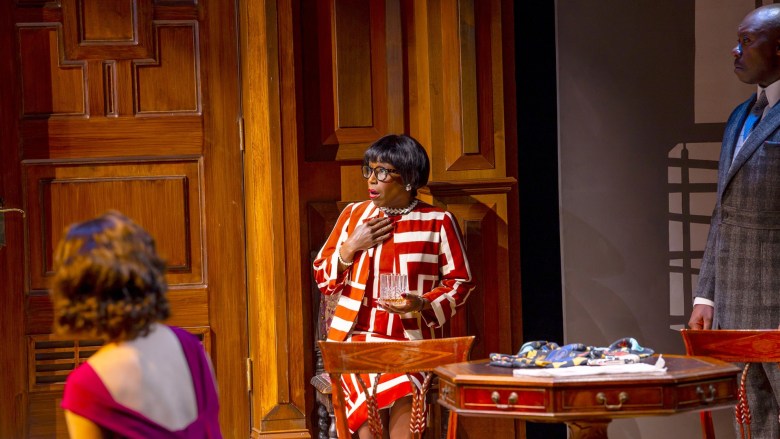By D. Kevin McNeir
Special to the AFRO
While a growing number of Black college graduates say their “dream jobs” include careers in medicine, law, business and technology, often with an emphasis on STEM fields in which they can achieve higher earning potential, there are still a few whose passion rests in the arts.
Hana S. Sharif, who took over as the artistic director for Washington, D.C.’s celebrated Arena Stage Theatre in July 2023, recently marked her directorial debut with the Agatha Christie classic, “Death on the Nile,” adapted for the stage by Ken Ludwig. (Photo courtesy Cheshire Isaac).
Hana S. Sharif, who spent her formative years in Houston, Texas, said she realized during her matriculation at Spelman College in Atlanta, Georgia, that if dreams could come true, she’d one day assume the helm as the artistic director of Arena Stage Theatre in Washington, D.C. The rest, as the saying goes, is history.
“I directed my first play when I was a senior in high school, but my journey truly began at Spelman where I co-founded Nasir Productions with the goal of developing a theater company that allowed us to create works that reflected our lived experiences,” said Sharif who served as the fledgling theater company’s artistic director. “I’ve never felt like I didn’t belong, and I have maintained that attitude and desire to learn as much as I could about the ways in which large-scale theater companies work.”
From Spelman, she returned home to Houston where she earned a master’s of fine arts at the University of Houston and then moved to Hartford, Connecticut, for an internship with Hartford Stage.
“I only planned to stay in Hartford for a year or so. I wound up staying for 10 years,” she said. “It was an amazing opportunity for me because while I was only in my early 20s, I really learned the ropes. I was the liaison to every department, and I eventually discovered how to communicate my artistic vision in a language that each department could understand. I also realized that having an entrepreneurial spirit was a real benefit to my development.”
Dreaming big requires time to assess the path to achieve success
Sharif said that after completing her 10th year at Hartford Stage, she knew it was time to seriously ponder her future and her goals.
“I took a break from regional theater work so I could freelance, produce, direct and figure out if the dreams I had at 20 were the same as I approached my mid-30s,” she said. “I asked myself if I really wanted to become the artistic director for a major regional theater – a question to which I quickly responded in the affirmative.
“But it was a bittersweet realization because no Black woman had ever been the artistic director at any of America’s top theaters. Still, I wanted the job, and I wanted to be the first. And you know, after achieving a clarity of purpose, the universe began to open doors,” she said.
With her goals clearly defined, Sharif continued to hone her skills, joining the Baltimore Center Stage for a five-year stint as artistic director.
Then, in 2018, she accepted the challenge as artistic director for The Repertory Theatre of St. Louis (The Rep) – the first Black woman to hold the position. During her five years with The Rep, she remained on the lookout for directing opportunities and achieved formidable results as illustrated by her directorial debut of an adaptation of Jane Austen’s “Pride & Prejudice,” which became the highest grossing show in the company’s history.
“I was successful in St. Louis because I was fortunate to connect with other Black women from across the U.S., each of whom had lofty goals like me, and we created a sisterhood that enabled us to lean on one another and amplify each other’s work,” she said. “We helped our sisters navigate the real challenges we faced as artistic leaders who were women of color.”
 L-R: Katie Kleiger (Jacqueline de Bellefort), Felicia Curry (Annabelle Pennington) and Jamil A.C. Mangan (Colonel Race) star in Agatha Christie’s “Death on the Nile,” which continues at Arena Stage Theatre in Washington, D.C., through Dec. 29 and is the directorial debut for Arena’s Artistic Director Hana S. Sharif. (Photo courtesy T. Charles Erickson Photography).
L-R: Katie Kleiger (Jacqueline de Bellefort), Felicia Curry (Annabelle Pennington) and Jamil A.C. Mangan (Colonel Race) star in Agatha Christie’s “Death on the Nile,” which continues at Arena Stage Theatre in Washington, D.C., through Dec. 29 and is the directorial debut for Arena’s Artistic Director Hana S. Sharif. (Photo courtesy T. Charles Erickson Photography).
Sharif’s career comes full circle with appointment at Arena Stage
“Walking in the footsteps of Molly Smith, who retired at the end of June in 2023 after 25 years as Arena Stage’s artistic director, has been a special gift and so far, an amazing journey,” Sharif said. “But I’ve dreamed about this moment since I was 19 when I first began to study the works and life of Zelda Fichandler who co-founded Arena Stage in 1950 and who was instrumental in the development of the U.S. regional theater movement.
“So, I have come full circle, leading one of the most iconic theaters in America where I am allowed to create art in a city in which policy and power repeatedly collide, and to choose works that allow us to reflect on some of the most urgent questions and issues humanity faces today,” Shariff said.
She recently directed her first play at Arena Stage in the world premiere adaptation of Agatha Christie’s “Death on the Nile,” which has been well received by both audiences and theater critics alike since its debut on Nov. 30.
“Part of our work at Arena Stage is to provide opportunities for people to be entertained and to secure a means of escape,” she said. “Mysteries and romances allow us to venture into the journey of great storytelling. So, it was easy to say yes to directing the work of Christie who is the most published and most read author in history.”
Sharif elaborated on the new production.
“As for this production, it combines complicated storytelling with an incredible ensemble and the support of a talented writer, Ken Ludwig, who has fine-tuned this classic and integrated comedy,” she said. “It’s truly the kind of story that I wanted to direct and we wanted to tell at Arena Stage.”
Diversity accentuates productions and serves as the bedrock of Arena Stage
History buffs, when speaking about Arena Stage, are quick to point out that when it opened its doors in 1950, it became the first racially integrated theater in Washington, D.C.
In 1967, the celebrated Black actor James Earl Jones starred in “The Great White Hope,” which later moved on with the original cast from Arena Stage to Broadway. Arena Stage thus became the first regional theater to transfer a production to Broadway.
In 1968, portions of a $250,000 Ford Foundation grant would allow the company to establish a pathway for the training of Black actors. Later, in 1987, Arena hosted a symposium on nontraditional casting – something which continues to undergird the philosophy of the company and its leadership.
Felicia Curry, a District-based singer and and host of “WETA Arts” on WETA/PBS for the past four years, said she joined the cast of “Death on the Nile” because while her racial identity is always on the table as soon as she takes the stage, it’s not what the play is all about.
“I portray a character who has not traditionally been a woman of color, and I know that some people need a few minutes to let that sink in – that a Black woman is representing a character who has more often, if not always, been White,” Curry said. “For me, that’s part of the excitement because I’ve been given the green light to step into this role with my Blackness and make it my own.”
Curry said while many of the plays with roles for Black actors are based on the so-called Black experience and associated traumas, Arena Stage’s production of the Christie classic allowed her and the other ensemble members to stretch their wings and have fun.
“This is a mystery with a generous sprinkling of comedic elements because of the changes that playwright Ken Ludwig made to the play,” she said. “I am having the time of my life because we’re a group of talented actors, crew members, directors and writers who have created a community both on stage and behind the curtain. It’s the kind of play that will make people laugh and then alternatively be frightened. But if you want to correctly guess who done it, you need to pay close attention.”
“Death on the Nile” continues through Dec. 29 at the Arena Stage Theatre. Artistic Director Hana Sharif’s next opportunity to direct a production takes place in 2025 with “The Age of Innocence” (Feb. 28 – March 30). For more information, visit www.arenastage.org.



